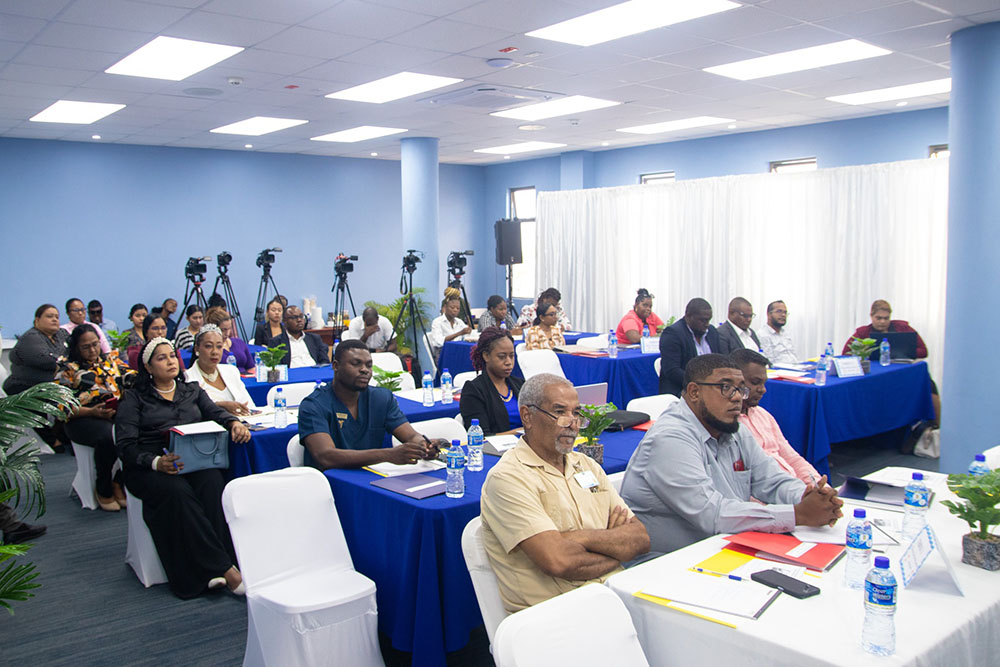Minister of Health Dr Frank Anthony said at the recent Annual RHOs Conference that 216 more interventions are being targeted for primary health care.
Anthony highlighted that in consultation from Pan American Health Organisation (PAHO) consultants, they were able to map out approximately 216 services that should be offered within the Primary Health Care Services. With this, he said that the Regional Health Officers (RHOs) will be able establish the various services within the health centres and health posts.
“We’ve had a number of consultants who came in from PAHO and worked with us in the area of Primary Health Care, to map out the types of services that we can now offer at our health posts and health centres. We came up with approximately 216 interventions that can be offered. This is something that we would expect our RHOs to implement and work systematically to ensure that these services can be offered at every Health facility, based on geographic location”, he said.
The health minister further said at the July 17th meeting that the government had invested in facilities so that people can be offered better services.
“Over the last two years, we would have given, apart from your regional budget, each RHO at least $100 million to help with the upgrade of infrastructure in your regions. So you got a $100 million last year, you got another $100 million this year and we are going to give you another $100 million per region, so that we can look at improving accommodation for staffing across the different regions”, he said.
He added that despite the salary increase, some nurses across various regions are yet to benefit from it which needs to be rectified.
Anthony urged persons to take booster doses of vaccines as a new strain of COVID-19 called EU 1.1 is surging in some countries. He noted that Guyana has the capability to test, diagnose and treat monkey pox cases.
More malaria cases have been seen in regions One, Seven, Eight and Nine, however last year insecticide impregnated bed nets that killed mosquitoes as soon as they land on the nets, were distributed to residents. More than 60,000 insecticide nets were distributed within the affected regions. Malaria was observed mainly in and around mining camps.
The ministry is also working on a school health programme which caters for screening of a child at least once in nursery, primary and secondary schools in areas of disease, vaccination profile, earing, and vision testing.
He pointed out that several regional hospitals are under construction in Region 2 at Lima; De Kinderen; Diamond, East Bank Demerara; Enmore, East Coast Demerara, Bath Settlement; and Skeldon, Berbice. Each of the hospitals features a 75 in-patient bed capacity, two operating theatres with an additional minor theatre, an imaging suite with digital X-rays, CT scans, ultrasounds, a 24-hour accident and emergency unit, and other outpatient services.
The Bartica Hospital is expected to start before the year ends with the resources being provided by the Indian Government. In addition, a team from the ministry is presently in Kamarang engaging the residents as plans are underway for a new hospital to be constructed there as well. Lethem Hospital is to benefit from an upgrade while Moruca and Kato villages are to benefit from two new hospitals.
The existing New Amsterdam Hospital is to be replaced with a new one and the facilities of the psychiatric department will be upgraded.
The construction of a maternal and child health hospital is underway and once completed will be a 256-bed institution. This hospital will have the first Magnetic Resonance Imaging (MRI) in the public sector. There will be a complete CAT Laboratory and a suite for cardiac surgery will be constructed so that the paediatric patients who would usually be sent abroad for surgery will now be able to be treated in Guyana.
The Minister also said that through McMaster University, Guyana will benefit from a Neonatal Care Programme for the regions. He added that the programme is funded by the Canadian Government and costs Cdn$2.4 million.



